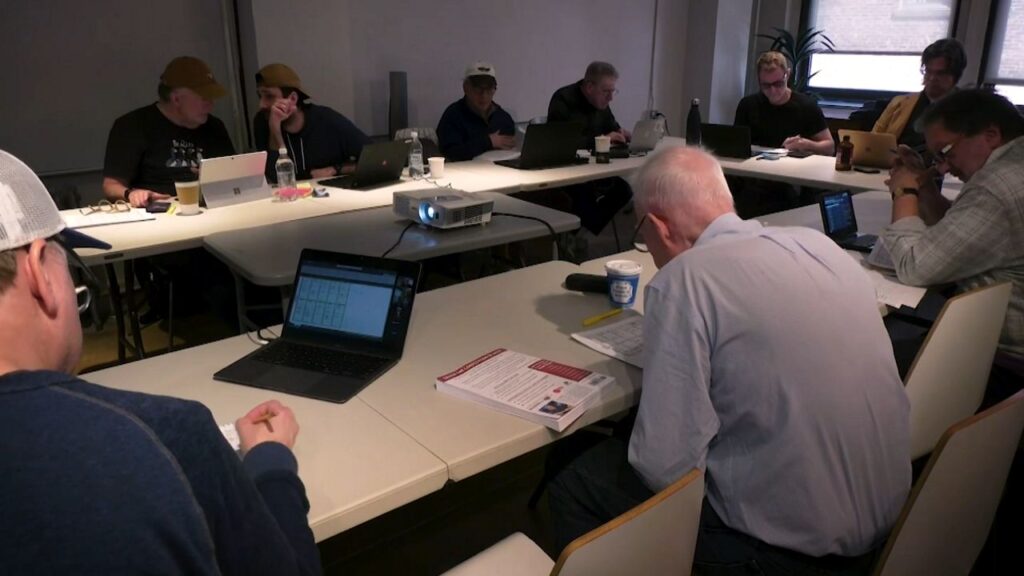For those who play fantasy baseball, the offseason can feel like an eternity.
But after weeks of preparation and sleepless nights, it's March and draft day is finally here.
“My mindset? I have no idea at this point. I'm nervous,” said Peter Geathers, one of the league members.
His nervousness is understandable, since this is not some old fantasy baseball league, but the oldest league in the world.
And Peter Geathers, the proud owner of The Fish, has been playing the game longer than anyone.
“This year, I'm more nervous than anyone else because I'm participating without any money,” Geathers said. “I have to be patient, but that's not what's best for me. I have to wait and then swoop in like a shark and try to get good players on the cheap.”
Forty-four years ago, Geathers was sitting at a table and inadvertently became one of the 11 “founders” of fantasy baseball.
They weren't trying to start a new national pastime. They were just having fun.
In the offseason after the 1979 baseball season, Dan Okrent had an idea. He decided to draft an entire team with real Major League Baseball players, fill in hypothetical lineups, and calculate statistics based on their actual performance.
By the spring of 1980, he had gathered 10 baseball fans together to play a game he dubbed “Rotisserie Baseball.”
“A friend of mine called and said, 'I have one with your name written all over it.' Would you be interested?'” Geathers said.
They were more than interested. All 11 players were completely hooked.
“We realized this is the most fun thing in the world,” Geathers said. “You can't imagine how advanced dementia was when we started this work. We spent more time on this than we did on work. I thought I was the team owner, but I was completely blown away.”
Remember, this was before the internet. So they manually documented all the statistics every day.
“I would read USA Today in the morning and play baseball.” [statistics] You can write it down with pen and paper and someone will add it up over the weekend,” Geathers said. “It took many hours a day, but it was amazing.”
Nothing was off limits to gain an edge.
They started traveling to Florida for spring training just to scout players.
“You'd see a young pitcher throwing 98 miles per hour and you'd think, 'Oh my god, this guy is going to be a huge Giants star,'” Geathers said.
If Geathers was watching a game and saw one of his players injured, he would pretend to be a reporter, pick up the phone, and call the team's front office.
“The first year, they said, 'Oh, he's going to be out six weeks.'” I immediately picked up the phone and called another owner and said we're going to trade him. ,” Geathers said. “So many people were doing this stuff that Major League Baseball actually said to all their offices, 'Please don't give out information to these crazy fantasy baseball fans.'”
Geathers and his fellow team owners were having the time of their lives.
“But it never occurred to me that other people would actually want to do this,” Geathers said.
Fast forward to today, and over 50 million Americans play some form of fantasy sports, making it a multi-billion dollar industry.
“We completely missed the boat,” Geathers said.
they had a chance. In 1983, someone offered $1 million to buy the league and strengthen it.
But they passed.
At this point, they were beginning to host rotisserie baseball conventions for their fans.
“We figured the real money was in the T-shirts we could sell at the convention,” Geathers said.
They were also keen to keep the word “Rotisserie”.
“So everyone in the world said, 'Well, okay, let's call it fantasy baseball.'”
But for them it's always “Rotisserie”.
“Because in the first meeting with all the owners, it was like, 'Are you in or are you out?'” “I was at a restaurant called La Rotisserie,” Gethers said. Told.
La Rotisserie Française on East 52nd Street is long gone.
But the little games created there seem to be everywhere.
Looking back, Gathers said he wasn't surprised that it turned out the way it did because he believes fans have all the answers when it comes to helping the team win championships.
“This literally gives us the opportunity to put our money where our mouth is,” Geathers said. “I can draft players, and in some ways more importantly, I can trade players. It's a joy to own a player and watch him go 0-12. Then you break your leg or you come up with shoulder surgery, and it's both a joy and a pain because they're your players, and you're totally hooked.”
Forty-four years later, he's still hooked.
They are still playing the traditional way and Geathers is still fine-tuning his drafting skills.
“I didn't do well,” Geathers said after opting out of this year's draft. “I'm trying to sneak out of here because I think I'm completely doomed to fail and I hope no one recognizes me, especially my players.”
But the season is long, and he thought of the millions of people he's playing with right now.
“We did this for fun, not for profit,” Geathers said. “And it’s really satisfying to be able to do this thing that’s so popular now.”


